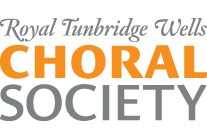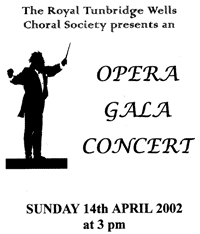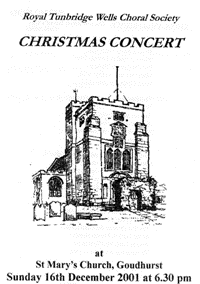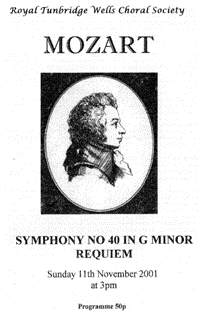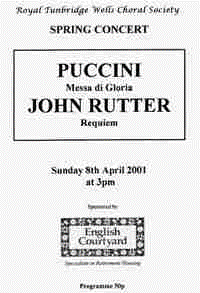Programmes and Reviews for end of 97th and 98th season
First concerts of 21st Century
Mozart
Requiem
Symphony no. 40
Assembly Hall
11th November 2001
conducted by Derek Watmough
Mozart’s great Requiem Mass in D minor (K626) was the main work in the concert given by the Royal Tunbridge Wells Choral Society in the Assembly Hall on Remembrance Sunday.
From the first entry the chorus impressed with their admirable clarity of diction: what a blessing it is when even from a familiar text the words are clearly heard.
The balance between the tenors and basses on the one hand, and the greater number of altos and sopranos on the other, was also well managed, and the way in which the the chorus as a whole dealt with their entrances and exits was a tribute not only to Derek Watmough’s thorough training of the choir in rehearsal, but also to his well-tried conducting technique.
There was at least one moment, in the Offertorium, when I caught his baton positively quivering with intensity.
The RTWCS chose its four soloists with equal care. Each of them sang their solo parts with individual distinction, but when their voices came together either in duet or quartet, the ensemble also worked well.
The soprano Rachel Nicholls has a pure clarity of tone, while the mezzo-soprano Kathryn Turpin provided an effective contrast with her warmth and smoothness of line.
Kevin McLean Mair, who trained at Aldeburgh, has one of those attractive English tenor voices entirely free of mannerism, and Martin Robson has a splendid Giovanni-like bass that filled the Assembly Hall with no difficulty at all.
© Robert Hardcastle
Rutter Requiem & Puccini Messa di Gloria
8th April 2001
What a joy it was to hear a choral concert so full of good tunes, as presented by the Royal Tunbridge Wells Choral Society and their musical director Derek Watmough. First we heard Puccini’s Messa di Gloria a fresh youthful work.
The piece is delicately and ingeniously scored. The brass section is used sparingly, but to great effect, as befits an admirer of Verdi. The benefit of such skill and restraint in the use of the orchestra was immediately apparent in the Kyrie, in which Derek Watmough achieved a perfect balance between voices and strings.
Then followed the splendidly spirited Gloria – a tune more suitable for a music hall than a church, one might feel – which gives way to a tenor solo once described as the first genuine Puccini aria.
Then is the Gratias agimus tibi, in which Huw Rhys-Evans excelled, as he did in the Credo, later, with Et incarnatus. The South African-born baritone John Fletcher, was also very impressive in the poignant Crucifixus est and in the solo Benedictus in the middle of the choral Sanctus.
Surprisingly perhaps, there is very little for the soprano to do in this work – Alison Smart’s delightful voice was to be heard to great advantage later in the concert – but the two male soloists worked extremely well together as they sang their alternate parts in the Agnus Dei, supported by more fine singing from the chorus.
Almost certainly composed for some other purpose, this closing section of the Messa di Gloria is structurally the weakest link, to coin a phrase.
It leads to the Mass or at least the music, to a sticky end, and the audience had to be reassured by the conductor before allowing itself to applaud! But applaud it did most generously, and rightly so, for all the glories that had gone before.
After the interval came the Requiem by John Rutter, one of the most attractive of recent works by British composers, which in less than twenty years has won for itself a permanent place in the choral repertoire.
And it is not difficult to see why. As we know from his celebrated carols, John Rutter knows all about writing for the human voice, his orchestral skill and sense of scale and shape are of a standard to match, and he writes tunes Andrew Lloyd Webber would give his eye teeth for.
The work opens with a solemn funeral beat that creates an atmosphere of sinister gloom, suddenly dispersed by a wonderful burst of sound on lux aeterna. From that moment on all is well, and we are carried forward to the moving simplicity of the Kyrie.
The second section, Out of the Deep has a demanding cello obligato, very well played by the Royal Tunbridge Wells Choral Society’s Chloe Allman-Ward, while in the pastoral The Lord is my sheperds setting there were also quite outstanding performances from Helen Pye (oboe) and Jane Lister (harp).
The choir remained seated as they gave celestial backing to Alison Smart’s moving Pie Jesu, while under Derek Watmough’s direction the choir and the orchestra, led by Martin Palmer, created a marvellous sense of fulfillment as they brought Rutter’s work, unlike that of Puccini, to a most satisfying and convincing conclusion.
© Robert Hardcastle
